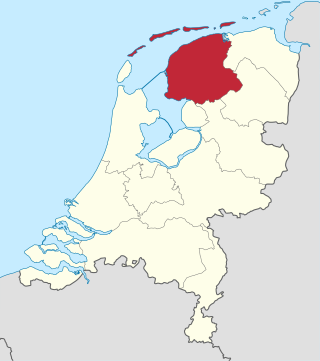
Friesland, historically and traditionally known as Frisia, named after the Frisians, is a province of the Netherlands located in the country's northern part. It is situated west of Groningen, northwest of Drenthe and Overijssel, north of Flevoland, northeast of North Holland, and south of the Wadden Sea. As of January 2020, the province had a population of 649,944 and a total area of 5,749 km2 (2,220 sq mi).
Frisian most often refers to:
The Frisians are a Germanic ethnic group native to the coastal regions of the Netherlands and northwestern Germany. They inhabit an area known as Frisia and are concentrated in the Dutch provinces of Friesland and Groningen and, in Germany, East Frisia and North Frisia. The name is probably derived from frisselje. The Frisian languages are spoken by more than 500,000 people; West Frisian is officially recognised in the Netherlands, and North Frisian and Saterland Frisian are recognised as regional languages in Germany.

There are twelve provinces of the Netherlands, representing the administrative layer between the national government and the local municipalities, with responsibility for matters of subnational or regional importance.

Frisia is a cross-border cultural region in Northwestern Europe. Stretching along the Wadden Sea, it encompasses the north of the Netherlands and parts of northwestern Germany. The region is traditionally inhabited by the Frisians, a West Germanic ethnic group.
Friesland is a district (Landkreis) in Lower Saxony, Germany. It is bounded by the districts of Wesermarsch, Ammerland, Leer and Wittmund, and by the North Sea. The city of Wilhelmshaven is enclosed by—but not part of—the district.
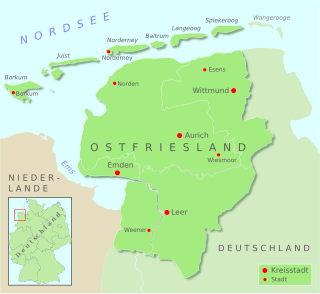
East Frisia or East Friesland is a historic region in the northwest of Lower Saxony, Germany. It is primarily located on the western half of the East Frisian peninsula, to the east of West Frisia and to the west of Landkreis Friesland.

The counts of Holland ruled over the County of Holland in the Low Countries between the 10th and the 16th century.
West Friesland or Westfriesland can refer to the following:
'Frisian flag' can refer to:
Friesland is a province of the Netherlands.
West Frisian can refer to:

West Frisia is a term that, when used in an international context, refers to the traditionally Frisian areas that are located west of the Dollart. Along with East Frisia and North Frisia, it is one of the most commonly used subdivisions of Frisia. In its narrowest sense, the term is synonymous with the province of Friesland. Within the Netherlands, however, it is mostly used to refer to the region of West Friesland, located west of Friesland.
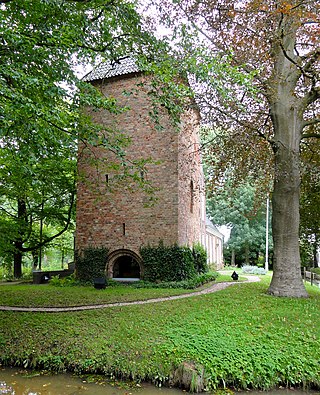
A stins is a former stronghold or villa in the province of Friesland, the Netherlands. Many stinsen carry the name "state".
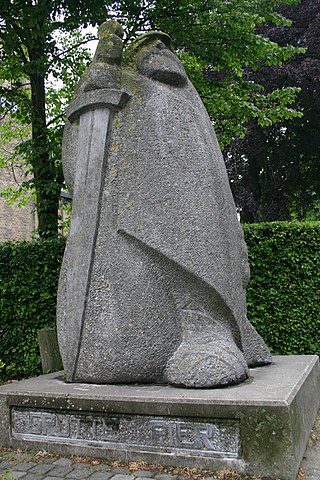
Frisia has changed dramatically over time, both through floods and through a change in identity. It is part of the Nordwestblock which is a hypothetical historic region linked by language and culture.

The County of East-Frisia was a county in the region of East Frisia in the northwest of the present-day German state of Lower Saxony.
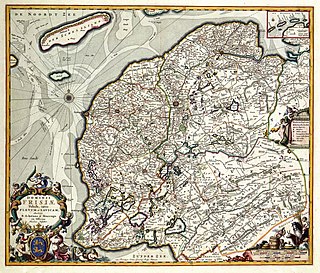
The Lordship of Frisia or Lordship of Friesland was a feudal dominion in the Netherlands. It was formed in 1498 by Maximilian of Habsburg and reformed in 1524 when Emperor Charles V conquered Frisia.

Frisian nationalism refers to the nationalism which views Frisians as a nation with a shared culture. Frisian nationalism seeks to achieve greater levels of autonomy for Frisian people, and also supports the cultural unity of all Frisians regardless of modern-day territorial borders. The Frisians derive their name from the Frisii, an ancient Germanic tribe which inhabited the northern coastal areas in what today is the northern Netherlands, although historical research has indicated a lack of direct ethnic continuity between the ancient Frisii and later medieval 'Frisians' from whom modern Frisians descend. In the Middle Ages, these Frisians formed the Kingdom of Frisia and later the Frisian freedom confederation, before being subsumed by stronger foreign powers up this day.
This page is based on this
Wikipedia article Text is available under the
CC BY-SA 4.0 license; additional terms may apply.
Images, videos and audio are available under their respective licenses.










